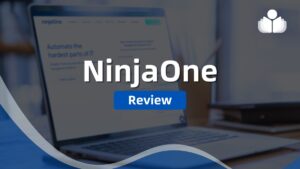Small and medium-sized businesses often face challenges managing multiple HR tasks and employee data. Therefore, adopting the right Human Resource Information System (HRIS) can streamline HR processes, centralize employee data, and significantly improve productivity. This article will delve deep into HRIS software, reviewing the best HRIS for small business owners in 2024.
Why do I need a human resource management system?
Adopting a Human Resource Management System (HRMS) in the contemporary business landscape has become increasingly prevalent. Here’s an exploration of the key reasons your organization might consider integrating an HRMS into its operations:
Centralized Data Management:
- An HRMS is a centralized repository for crucial employee information, streamlining access to employee details, attendance, performance evaluations, and payroll specifics.
Automation of HR Processes:
- By automating routine HR tasks, such as employee onboarding, attendance tracking, and leave management, an HRMS reduces manual efforts, minimizes errors, and allows HR professionals to focus on strategic initiatives.
Efficient Recruitment and Applicant Tracking:
- HRMS systems often include features for efficient recruitment and applicant tracking, simplifying the hiring process from job postings to candidate management.
Performance Management:
- To track and manage employee performance, HRMS systems support monitoring and managing employee performance and aid in goal setting, performance reviews, and identifying areas for improvement.
Time and Attendance Management:
- Automated time and attendance tracking features assist in managing employee work hours accurately, facilitating payroll processing, and ensuring compliance with labor laws.
Employee Self-Service (ESS):
- Employee self-service features empower individuals to access and manage their information independently, reducing the administrative burden on HR.
Compliance and Reporting:
- HRMS systems ensure compliance with labor laws and regulations, providing insights into workforce trends through generated reports for informed decision-making.
Enhanced Communication:
- The centralized platform of an HRMS improves communication by facilitating announcements, policy updates, and notifications related to HR matters.
Workforce Planning and Analytics:
- HRMS systems offer valuable analytics and insights into workforce trends, aiding organizations in making data-driven decisions for workforce planning, talent acquisition, and employee development.
Security and Data Privacy:
- Robust security features in HRMS systems protect sensitive employee data, ensuring compliance with data privacy regulations and safeguarding against unauthorized access.
Scalability:
- HRMS systems are designed to scale with organizational growth, accommodating workforce size and structure changes.
Cost Savings:
- Despite an initial investment, HRMS systems lead to long-term cost savings by reducing manual workload, minimizing errors, and improving overall efficiency.
Integrating an HRMS is a strategic move that contributes to operational efficiency, compliance, and the overall improvement of employee experiences within the organization.
Understanding HRIS: What is an HRIS?
HRIS, an acronym for Human Resource Information System, refers to a digital platform that manages employee data and automates various HR processes. These may include hiring, payroll processing, performance evaluations, and more. The primary objective of an HRIS is to optimize and streamline human resource management through digital automation and organized data management.
An HRIS acts as a centralized database for all employee-related information, allowing HR professionals to access, analyze, and manage employee data efficiently.
In small businesses, an HRIS can significantly enhance HR operations, improving accuracy, efficiency, and productivity.
Why is employee engagement crucial today?
Driving Productivity and Stability:
Employee engagement is a linchpin for organizational success, injecting vigor into the workforce and elevating productivity. Engaged employees showcase commitment, resulting in lower turnover rates and heightened job retention. This creates a stable and motivated workforce, fostering a positive cycle of dedication and achievement within the organization.
Cultivating a Positive Workplace Culture:
Beyond its quantitative impacts, employee engagement profoundly shapes workplace culture. It nurtures an atmosphere where creativity and innovation thrive, establishing a positive and supportive environment. This cultural shift leads to improved employee well-being and influences customer satisfaction. Engaged employees, driven by ownership, deliver exceptional customer service, fostering loyalty and enhancing the company’s reputation. In this dynamic interplay, the strategic significance of employee engagement becomes apparent, influencing not just internal dynamics but also external perceptions and relationships.
Why do I need an employee database, and what is human capital management?
Need for an Employee Database:
An employee database is essential for efficient HR management, as it centralizes employee information, facilitating easy access to records, performance history, and other vital details. It streamlines HR processes and ensures accuracy in employee-related data.
Human Capital Management (HCM):
HCM involves strategically managing employees as valuable assets. It goes beyond traditional HR functions and includes workforce planning, talent acquisition, development, and optimization of human resources to achieve organizational goals.
The pros and cons of a human resources management system
Pros:
Efficiency and Automation:
- HRMS automates routine tasks, saving time and reducing the risk of errors in HR processes.
Centralized Data Management:
- Provides a centralized platform for managing employee data, ensuring accuracy and accessibility.
Employee Self-Service:
- Allows employees to access and collect their information, reducing administrative workload for HR.
Compliance and Reporting:
- Assisted in maintaining compliance with regulations and generated reports for informed decision-making.
Cons:
Implementation Costs:
- The initial costs of implementing an HRMS, including software, training, and integration, can be significant.
Complexity for Small Businesses:
- Some HRMS platforms might be too complex for smaller organizations with limited HR resources.
Dependence on Technology:
- Reliance on technology means technical issues or system failures can disrupt HR processes.
Customization Challenges:
- Customizing HRMS to align with specific organizational needs may pose challenges and require expertise.
Resistance to Change:
- Employees and HR personnel may need help transitioning to a new system, impacting user adoption.
Understanding these aspects can help organizations make informed decisions about adopting an HRMS and the importance of employee engagement in the current workplace landscape.
Unveiling the Top 10 HRIS for Small Businesses in 2024
Based on extensive research and market data, here’s our comprehensive review of the ten best HRIS for small businesses in 2024:
Each of these platforms offers a unique blend of features and capabilities designed to meet the diverse needs of small businesses. To provide a comprehensive overview, we’ll dive deeper into each system, discussing its key features, pros, and cons.
Overview:
ADP is a leading HRIS provider renowned for its comprehensive core HR suite. It caters to some of the world’s largest companies, showcasing its payroll, time and attendance, and benefits administration expertise.
Key Features:
- Wide range of HR functionalities
- Comprehensive payroll, benefits, and compliance management
- The large customer base for benchmarking
- Recently revamped mobile app for an enhanced employee experience
- Pre-built integrations with leading ATSs, LMSs and performance tools
- Comprehensive HR suite
- Expertise in payroll and tax services
- The large customer base for benchmarking
- Recently revamped mobile app
- Customer support can be slow
- System rigidity, and customization challenges
- Pricing transparency issues
- Four different HRIS platforms leading to slower innovation cycles
Overview:
Gusto is a popular HRIS solution acclaimed for its robust payroll compliance features. It stands out with unlimited, automated payroll runs, flexible schedules, and comprehensive support for businesses with complex payroll needs.
Key Features:
- Unlimited, automated payroll runs
- Flexible payroll schedules
- International contractor payroll in 120+ countries
- Employee financial wellness tools via the Gusto Wallet app
- Secure storage of tax documents like I-9s and W-2s
- Comprehensive payroll solution
- International contractor payroll support
- Employee financial wellness tools
- Secure storage of tax documents
- Managers cannot perform HR functions on Gusto’s app
- Potential integration limitations, especially with benefits software
- Reports of slow customer service turnaround times
Overview:
TriNet Zenefits focuses on providing affordable benefits solutions tailored for small teams. Its flexible benefits offerings make it suitable for small businesses seeking to enhance recruitment strategies and employee retention.
Key Features:
- Flexible benefits offerings
- Variety of benefits offerings for recruitment and retention
- Built-in compliance tools to mitigate small business risk
- Flexible benefits offerings
- Variety of benefits offerings
- Built-in compliance tools
- No compliance assistance with HIPAA
- Potential integration difficulties, particularly with payroll
- Customer feedback on interface navigation not being very intuitive
Overview:
BambooHR automates HR processes, offering a comprehensive suite of tools for employee tracking, onboarding, payroll, performance reviews, and more.
Key Features:
- Comprehensive suite for employee tracking, onboarding, payroll, and performance reviews
- Pre-built and customizable workflows for HR task automation
- Data sync across payroll, benefits, and time tracking to reduce double data entry
- Comprehensive suite for HR automation
- Pre-built and customizable workflows
- Data sync across payroll, benefits, and time tracking
- Payroll, benefits, and time tracking are add-ons not included in base plans.
- Limited support for payroll and benefits administration outside the U.S.
Overview:
- Namely, it caters to medium businesses focusing on workforce development. Namely, it fosters a continuous improvement culture with a user-friendly interface, customizable performance review modules, and a newsfeed for employee milestones.
Key Features:
- User-friendly, intuitive interface
- Customizable performance review module
- Newsfeed for appreciating and celebrating employee milestones
- Managed services for payroll and benefits administration
- User-friendly, intuitive interface
- Customizable performance review module
- Newsfeed for employee appreciation
- Non-transparent pricing
- Higher-tier purchases required for advanced capabilities
- Limited payroll support outside the U.S.
Overview:
UltiPro, rebranded as UKG Pro, stands out for its cloud-based HCM solution focusing on analytics and business intelligence. With a history dating back to 1990, it offers a comprehensive suite of HR and talent management tools.
Key Features:
- Robust payroll processing with tax management
- Talent management tools for recruitment, performance, and succession planning
- Employee self-service portal
- Advanced analytics and business intelligence capabilities
- Comprehensive suite for HR and talent management
- Advanced analytics and business intelligence
- Employee self-service focus
- Higher pricing, especially for smaller businesses
- Complexity may require training for effective use
A Deeper Look into HRIS Software
An HRIS software helps HR professionals manage multiple HR tasks efficiently and effectively. The software is designed to simplify the complex task of managing HR processes. It centralizes employee data and automates various HR tasks, enhancing productivity and efficiency.
Rippling is an HRIS system that integrates well with other business apps. It offers a comprehensive suite of employee data management, payroll processing, and time-tracking tools, making it a sound choice for businesses needing global solutions.
Key Features:
- Modern user interface
- Offers onboarding modules that seamlessly sync IT and HR tasks
- Excellent at integrating with 3rd party software
- Dynamic workflow builder tool
- Highest reviews in the HRIS space for their modern user experience
- Offers onboarding modules that seamlessly sync IT and HR tasks
- Excellent at integrating with 3rd party software
- Does not currently offer performance or engagement modules
- Native time & attendance solutions may not be viable for businesses with complex workforce management needs
- The system’s scalability is a question, as the majority of their customers have below 200 employees
Paycor is an HRIS system focused on ensuring compliance and data security for mid-sized teams. It provides physical time clocks to support more accurate time punches for onsite workers and risk assessment teams to prepare against cybersecurity threats.
Key Features:
- Physical time clocks to support more accurate time punches
- Earned wage access (EWA) options
- Risk assessment team
- Comprehensive HR suite
- Advanced time clock solutions
- Risk assessment team
- Expensive solution for small businesses
- Does not support international operations
- Must purchase higher-tiered plans for customizable reports
Workday is an HRIS system that simplifies the initial onboarding process and streamlines employee data management. It offers a comprehensive suite of tools, including payroll, benefits administration, performance reviews, time tracking, and more.
Key Features:
- A comprehensive suite of tools for employee tracking, onboarding, payroll, and performance reviews
- Intuitive layout for easy navigation
- Data sync across payroll, benefits, and time tracking to reduce double data entry
- A comprehensive suite of tools for HR automation
- Intuitive layout for easy navigation
- Data sync across payroll, benefits, and time tracking
- Customer support hasn’t scaled to the same degree as its customer base, leading to reports of failed implementations and customer service failures
- The system is still very US-centric, making it less suitable for global companies
Zoho People is a budget-friendly HRIS that offers a comprehensive suite of HR tools to manage the entire employee lifecycle. It provides an intuitive platform for managing employee information, tracking time, and handling leave requests.
Key Features:
- A comprehensive suite of HR tools to manage the entire employee lifecycle
- Intuitive platform for managing employee information
- Tracking time and handling leave requests
- A complete suite of HR tools
- Affordable pricing
- Intuitive platform
- Limited capabilities around compensation or engagement surveys
- The new benefits administration system is still in its early stages and is unproven
- Some modules, such as performance and time & attendance, are relatively basic and only allow a little customization.
Other HR Software worth mentioning:
Background:
Kronos Workforce Ready is a cloud-based human capital management solution for businesses of all sizes. Acquired by Ultimate Software, Kronos Workforce Ready is now part of the Ultimate Kronos Group (UKG).
Features:
- Time and Attendance: Kronos Workforce Ready includes robust time and attendance tracking tools.
- HR and Payroll: The platform offers integrated HR and payroll solutions for comprehensive workforce management.
- Employee Scheduling: Kronos facilitates efficient employee scheduling to optimize workforce deployment.
- Analytics and Reporting: It provides analytics and reporting tools for workforce insights and decision-making.
- Unified Platform: Kronos Workforce Ready integrates HR, payroll, and workforce management in a unified platform.
- Scalability: The platform is scalable, catering to the needs of both small businesses and larger enterprises.
- Industry-Specific Solutions: Kronos offers industry-specific solutions tailored to various sectors
- Implementation Time: Users have reported that the initial implementation of Kronos Workforce Ready can be time-consuming.
- Customer Support: Some users have needed help with customer support responsiveness.
Background:
Ceridian Dayforce is a cloud-based human capital management platform catering to businesses of all sizes. Established in 1990, Ceridian focuses on providing a unified solution for HR, payroll, workforce management, and talent acquisition.
Features:
- Payroll Processing: Ceridian Dayforce offers robust payroll processing with tax compliance features.
- Workforce Management: The platform includes tools for scheduling, time and attendance, and labor forecasting.
- Talent Management: Ceridian provides talent acquisition, performance management, and learning solutions.
- Mobile Accessibility: Dayforce offers mobile access, allowing users to manage HR tasks.
- Unified HCM Solution: Ceridian Dayforce integrates multiple HCM functions, offering a unified solution.
- Advanced Analytics: The platform provides advanced analytics for workforce insights and strategic decision-making.
- User Experience: Users commend the platform’s user-friendly interface and overall experience.
- Pricing Complexity: Some users find Ceridian Dayforce’s pricing structure complex, especially for smaller businesses.
- Learning Curve: New users may experience a learning curve when adapting to the platform’s extensive features.
Background:
Insperity is a comprehensive HR outsourcing solution that provides HR services, payroll, and employee benefits. Founded in 1986, Insperity serves businesses of various sizes, offering tailored HR solutions.
Features:
- HR Outsourcing: Insperity offers comprehensive HR outsourcing services, including administration and compliance.
- Payroll Processing: The platform provides payroll processing with tax compliance features.
- Employee Benefits: Insperity offers a range of employee benefits, including health insurance and retirement plans.
- Workforce Optimization includes workforce optimization tools for talent management and performance improvement.
- Professional HR Services: Insperity’s outsourcing services provide businesses with professional HR support.
- Compliance Expertise: The platform offers expertise in HR compliance, helping businesses navigate complex regulations.
- Employee Benefits: Insperity provides various employee benefits, enhancing overall employee satisfaction.
- Pricing: Insperity’s pricing may be higher for smaller businesses with budget constraints.
- Learning Curve: New users may experience a learning curve when adapting to the platform’s extensive features.
SAP SuccessFactors is an integrated HCM suite that covers HR, payroll, talent management, and employee experience. Acquired by SAP in 2012, SuccessFactors caters to businesses of all sizes, focusing on cloud-based HR solutions.
Features:
- Core HR and Payroll: SAP SuccessFactors provides global capabilities for core HR and payroll processing.
- Talent Management: The platform includes tools for talent acquisition, performance management, and learning.
- Employee Experience: SuccessFactors enhances the overall employee experience through various HR modules.
- Analytics and Reporting: It offers advanced analytics for workforce insights and strategic decision-making.
- Global Capabilities: SAP SuccessFactors caters to businesses with global operations, providing international support.
- Integration with SAP: The platform seamlessly integrates with other SAP solutions for enhanced functionality.
- Continuous Innovation: SuccessFactors undergoes regular updates and innovations to provide cutting-edge HR solutions.
- Complexity: Some users find SAP SuccessFactors complex, requiring training for effective utilization.
- Implementation Time: Implementing the complete suite may take time, and businesses may need to phase in modules gradually.
Background:
Oracle HCM Cloud is an integrated human capital management solution developed by Oracle Corporation. Launched in 2011, Oracle HCM Cloud caters to businesses of various sizes, offering a comprehensive suite of HR tools in a cloud-based environment.
Features:
- Core HR and Payroll: Oracle HCM Cloud provides global capabilities for core HR and payroll processing.
- Talent Management: The platform includes modules for talent acquisition, performance management, and learning.
- Workforce Analytics: Oracle HCM Cloud offers advanced analytics for gaining insights into workforce trends and performance.
- Mobile Accessibility: It provides mobile access for HR management on the go.
- Global Capabilities: Oracle HCM Cloud is designed for businesses with global operations to provide international support.
- Scalability: The platform is scalable, accommodating the needs of both small businesses and larger enterprises.
- Integration with Oracle Applications: Oracle HCM Cloud seamlessly integrates with other Oracle applications for enhanced functionality.
- Complexity: The extensive features may overwhelm smaller businesses, and users may experience a learning curve.
- Pricing: Some users find Oracle HCM Cloud’s pricing to be on the higher side, especially for smaller organizations.
Strategies for Selecting the Best HRIS for Small Businesses
Selecting an HRIS system is a critical decision that can significantly impact your business’s efficiency and productivity. Here are some strategies to consider when choosing the best HRIS for your small business:
Analyze Core HR Functionalities
When choosing an HRIS, it’s crucial to analyze its core HR functionalities. The system should offer various HR features, including employee records management, payroll processing, talent management, etc.
Evaluate Key Features
A comprehensive HRIS should encompass core HR data management, payroll, time off, benefits administration, performance management, recruiting, onboarding, training, and an employee self-service portal. These features streamline HR processes, ensuring accurate data management, efficient payroll processing, and a user-friendly employee experience.
Examine User Interface (UI)
Consider the system’s user interface (UI). The system should offer a visually attractive, clean, and colorful interface that makes it fun for HR pros and staff at all levels to engage with the system.
Check Usability
Check the usability of the system. The system should be simple, straightforward, and intuitive, making it easy for users at all levels to complete tasks independently.
Review Software Integrations
Review the HRIS platform’s software integrations. The platform should integrate with other standard HR tools to cover features that aren’t already custom-built into the HRIS system.
Assess Pricing
Finally, assess the pricing of the HRIS systems. The system should offer a reasonable price per employee, with transparent details on how much it would cost to scale up and add more features over time.
HRIS Trends for Small Business in 2024
As a small business owner, you might not be on top of all the latest HR trends, but you’re always striving to do a good job and keep your staff happy. Here are a few of the trends to watch out for in the HRIS space that are especially beneficial to small businesses:
AI-Powered Compliance Management Features
Small businesses often need help with staying compliant with ever-changing employment laws. Modern HRIS systems are equipped with features to manage compliance-related tasks, such as tax filing, labor law adherence, and data privacy regulations.
Employee Self-Service Platforms
Employee self-service features are becoming increasingly popular in HRIS solutions. These systems empower employees to manage their personal information, benefits, leave requests, goal-setting, and performance management.
Integrated Performance Management Systems
Many HRIS systems now integrate with performance management software or offer performance tools, allowing you to track employee performance alongside other data, like their compensation and benefits.
Distributed Workforce Management Tools
With the rise of hybrid and remote working models, HRIS tools that support remote, hybrid, and distributed work models are crucial.
Embracing these technologies can lead to more efficient processes, better talent management, and ensured compliance adherence. Implementing these trends can pave the way for HR to be seen as a strategic partner at the leadership table.
Conclusion
In conclusion, choosing the best HRIS for small business owners requires a thorough understanding of your business’s HR needs and a close examination of each system’s features, usability, and pricing. The right HRIS can streamline your HR processes, centralize employee data, and improve productivity, ultimately contributing to your business’s success.
 Sections of this topic
Sections of this topic
















